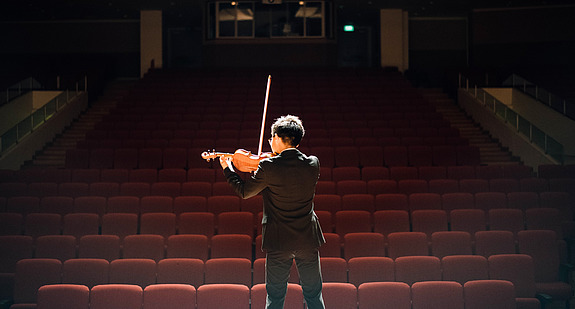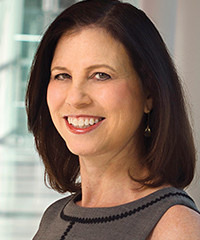David Lang on How Music Will Change Post-Pandemic

David Lang, Artist-in-Residence at the Institute for Advanced Study, is a Pulitzer Prize–winning contemporary classical composer. He is the curator of the Institute’s Edward T. Cone Concert Series, and for Teatime at Home is curating recordings of past series performances. He is also Professor of Music Composition at the Yale School of Music, and cofounder and co-artistic director of New York’s Bang on a Can music festival. He spoke with Joanne Lipman, the Institute’s Peretsman Scully Distinguished Journalism Fellow, about the impact of the coronavirus pandemic on music, composition, and live arts performances. This conversation was conducted on April 10, 2020. It has been edited for length and clarity.
Joanne Lipman: How is the pandemic impacting live performances?
David Lang: My field, classical music, existed long before recording was even possible. The only way to hear music was to be in its presence while it was being performed.
Classical music preference is live performance over everything else—even though most of the classical music that we hear now is on a recording. Our field believes at its core that it is about transmitting something to you live. So there’s something fundamental about what we do that’s gone now, completely. The rug is completely pulled out from under what it is we do, and how we think about the value of what we do.
JL: Does the fact you can’t hear and see it live now change the purpose of music?
DL: It is really mind-blowing when you think about it. In classical music there are lots of parameters to the experience. There are the notes themselves, which may be hundreds of years old. There’s the performance history of hundreds of years of people figuring out how to breathe life into those notes. There’s the experience of the players on stage. There’s the experience of the audience, what they look like, what it feels like when you hear something good on stage and you feel the ripple of approval going through the audience.
There are all these things that we think of as being united, as being exactly the same thing. We’ve never had to separate those things from each other before. It raises the question of what is that thing, that is essential to our core, that connects us to the music? Is it talking about the music? Is it pre-recording the music? Is it sharing old recordings? Is it live performance?
JL: Wasn’t this an existential question when recording was first invented more than a century ago?
DL: People thought recording was an inadequate simulacrum of the real experience, that you have to make do with this imperfect representation of the original.
JL: Doesn’t the cancellation of live performances hurt theater and dance and other kinds of live arts just as much?
DL: Certainly, for dance, and choreography, and for theater. But those worlds have gotten used to the idea that they’re ephemeral. That’s the paradox that’s at the core of their existence: “Here’s this thing that we take great care to make, and we’ve rehearsed for six weeks, and we’ve put it up in front of you, and it’s gone in 45 minutes and it will never happen again.” The only thing you can have is that ephemeral experience.
Classical music is much more snobbish. We think we are making something eternal. One thing we have that other disciplines don’t is, we have the exact communication from Bach to us. We have the representation that Bach chose of how to communicate with us in a modern way. We pride ourselves on having this kind of connection to something which we think will last.
The shock to classical music is that we’re coming to terms with something that theater and choreography already have at their core.
JL: Musicians have been incredibly innovative in using technology during this time period, whether it was the Hamilton cast reuniting on Zoom, or a YouTube video of violinist Gil Shaham and his wife playing the Bach double concerto with brothers Eric and Colin Jacobson, from the Knights orchestra. Will we see more of that?
DL: As musicians, there’s one thing we value, and that is sharing what we do with other people. So, I think that’s why there’s this huge outpouring.
Personally, I have never had so much of my music available on video released to the world, because everyone who has ever performed a piece of mine is now saying, “We must release something. Here is some music we recorded last year.”
Part of it is about trying to make ourselves feel better about our lack of power over our situation. I think part of it is a genuine impulse to do good. But I’m already overwhelmed with the fact that there are all of these good messages, and all of this music that’s out there. I already find that the amount that’s out is overwhelming.
JL: What type of new music do you think will emerge from this period?
DL: I’m not sure anybody really knows. After September 11th, everybody was in a very mournful state of mind and there was a lot of memorial music. There was John Adams’s beautiful piece, and Steve Reich’s beautiful composition, and Michael Gordon’s very moving piece. There was a mood that we could all agree on.
I’m not sure what the mood is going to be. So, I don’t know what kind of experience people will want. Will people want a giant celebration of finally being set free? Will the mood be for a universal period of remembrance for all the people who have died? Or will it be just forgetfulness? Will it just be people saying, “Here is the Mozart symphony that we were going to play that got cancelled. We’ve been waiting to get back to normal, and we want to forget that this ugly thing ever happened.”
JL: What will happen with large concert halls and stadium shows?
DL: People are going to have to figure out how to make them safe. I imagine there is going to be social distancing and seating where somebody sells every fourth seat in every fourth row. I would go to that concert. I like going to concerts; the point for me is to listen to the music by myself anyway. Social distancing in a concert can be very effective, especially if the music is trying to put you in a very reflective state of mind.
But it’s hard to say we would like to have a heroic moment that reminds us of the world we used to live in, in a room where everyone is spaced out wearing masks. It’s going to be a very weird feeling.
JL: As a composer, does the pandemic experience change your approach to what you are creating now?
DL: I’m doing two projects at this particular moment. I’m actually doing a bunch more than that, but I’ll talk about two. I’m setting to music a lecture that Gertrude Stein gave after World War I. She’s talking about how the War affected her as a writer. At first, I was more interested in her as a creator, somebody who is idiosyncratic. That’s the way I was setting the music, to highlight the oddball way the texts are working.
After coronavirus started, that changed for me. The piece took a left turn and became much more introspective. Because what she’s really saying is, we have to be different people because we’ve been through this horrible experience. That wasn’t necessarily in the front of my mind while I was writing music, but after this happened, it definitely was the way I finished the piece.
JL: Fascinating. You said there’s a second piece too?
DL: Yes. I’m also working on the libretto to a big opera, which is going to premier next year. It’s a love story based very, very loosely on a story by a Japanese writer, Akutagawa, called “Autumn Mountain.” It’s about two people talking about a painting that they saw fifty years ago. They both recognize that it was an important part of their relationship. Then they try to describe their memory of it and they can’t agree, at all, on what the painting is.
I became much more interested in writing not about their romantic relationship, but their social relationships, their place was in society. Again, that’s something on my mind. We’re living in this period where inequality determines whether or not you live. So, the idea that these are old people, it means something that they’ve lived. In our society, that means you have a privilege that is being fought for, and is being fought over, and taken away from you. Society is not uniformly interested in making sure that everyone gets to your age.
This issue of how you get to be an old person, that’s a political issue in our country. I wasn’t really thinking about when I started working on this piece last year.
JL: What does the pandemic mean for ensembles, like orchestras or theater troupes?
DL: The world we come out of is going to be very different because, of course, a lot of young ensembles and a lot of orchestras are having a huge amount of difficulty right now.
I imagine that many of them will go out of business, at least temporarily. The Metropolitan Opera had to let everyone go. They’re the most successful organization in the country and they are losing money. They are having to ask themselves if they are sustainable. So, when the Cadillac institutions are unsustainable, you can imagine that all the smaller institutions are having great difficulty as well.
JL: You cofounded Bang on a Can, the organization and music festival, in 1987. How is Bang on a Can handling the pandemic?
DL: This year, we were going to do a gigantic international live festival in the first couple days of May called Long Play, which had over sixty concerts crammed into three days, all in walking distance in Brooklyn. That festival, of course, has been postponed.
But we realized the musicians that we were going to hire have no other work, and performers have no work and the composers have no work. So, we’re going to do as much as we can of what we had originally planned to do, as a live broadcast. We’re going to have solo performances, and we’re commissioning new pieces, and we’re hiring young musicians.
We’re trying as much as we possibly can to make sure that these people stay alive. We can’t help every single person in the music world. But I feel like we’re obligated. We have a summer music school. These are some of the most talented young musicians who are dedicating their lives to experimental music. They’ve just come through music school and they’ve just moved to Brooklyn and started an ensemble and now there’s nothing for them. So, we have to figure out how to make sure that they don’t give up.
JL: This will be a virtual festival?
DL: Yes, on May 3. We’re going to have six hours of performers from all around the country—including successful composers—coming in from their living rooms. We have Meredith Monk, and we have Steve Reich, and we have John Adams, all these really great people.
JL: How are you financially supporting this?
DL: We’re doing a combination of things. We’re mostly using our savings to make sure that no one who is in our office has to get furloughed. We’re continuing to pay for them and pay for their health insurance. We have to make sure that everybody is taken care of.
For the people participating in the festival, we’re paying them. The important thing is to make sure that we can pass money to people. I think we will end up asking people during the broadcast to contribute money. It won’t be quite the Jerry Lewis Telethon, but I think it’s important to do it. Even if we don’t raise a dime from that, we will still pay everybody. We have to commit to paying people. If somebody wants to help us, that would be great.
JL: You hear stories about great bursts of creativity and genius during crises, like Shakespeare famously writing Macbeth during the bubonic plague. Do you expect a similar outpouring of creativity among musicians and composers now?
DL: I’m not saying this to be flippant, but the life of a composer is pretty quarantined to begin with. There’s nothing better for us than to shelter in place.
In fact, I’ve been very, very, very productive. I haven’t written Macbeth, but, what composers do every day, if we are lucky, is we sit in one place, in a tiny room, and we close the door, and we work for as long as we possibly can. I was supposed to spend the month of April traveling. In fact, the really incredible thing that’s changed in my life is I don’t think I was supposed to be home for more than two or three days between now and the end of August.
JL: Looking ahead, with so much content now free online, will live performances regain popularity after the pandemic subsides?
DL: All of these art forms that you are talking about, the whole point is to make sure that people are connected. It’s kind of like a religious experience, theater and dance and music, these things which depend on live performance. There’s nothing to replace being in a room full of other people who are all having the same experience and trying to appreciate it at the same time.
When you’re listening to a sermon, you’re getting the words, right? The words may be interesting, but that’s not nearly as powerful as 1,000 people sitting there all hearing those words together.
That’s the core of the religious experience, the religious part of live performance. It’s an act of faith that people can come together. Saying, “I’m going to listen to your tapes,” is an act of hunger on the part of performers who want to be recognized and seen. But the real act, the social act, is us all together, seeing and hearing something together.





